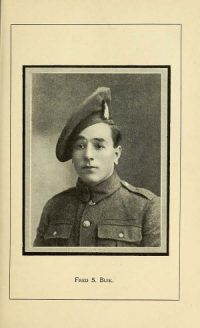Great War Dundee
This is Dundee's story of those that served in the First World War, and of the people left at home
We need you to tell us more about the life and times of Frederick Strachan Buik
Frederick Strachan Buik
Military Information
- Date of enlistment:
- Place of enlistment: Kirkaldy
- Service no: 27789
- Rank: Private
- Service Occupation:
- Awards:
- Regiment/Service: King's Own Scottish Borderers
- Unit/Ship: 2nd Battalion
- Place of Death: France
- Age at Death: 21
- Date of Death: 20.10.1918
- Burial Country: France
- Cemetery: Caudry British Cemetery
- Grave/Mem Ref no: IV.G.25
Personal Information
- Date of Birth: 25.05.1897
- Place of Birth: 118 Rosebank St, Dundee
- Address: 4 Kinnaird St, Dundee
- Occupation: Compositor, Caxton's Printers, Dundee
- Mother:
Annie Batchelor Buik, 4 Kinnaird St, Dundee
- Father:
Alexander Buik, 4 Kinnaird St, Dundee
- Siblings:
Peter, James, Francis, David, Annie & Robina
- Spouse:
- Children:
More about Frederick Strachan Buik
Private Frederick Strachan Buik, 2nd Battalion, King’s Own Scottish Borderers, born on 25 May 1897 at 118 Rosebank Street, Dundee, was the youngest son of William Buik, a Calender Worker, and Ann Buik, of 4 Kinnaird Street, Dundee.
Fred commenced his compositor apprenticeship on 18 November 1912. He had received his schooling in St. Salvador’s Episcopal School and in Stobswell Public School, and had worked for a short time as office boy with Baxter Bros. & Co., Ltd. He was a boy of good promise, of an attractive disposition, anxious to learn, and clever at his work.
Of an athletic temperament, Fred was keenly interested in football, cycling, swimming, and gymnastics, but of these he seemed to take the greatest pleasure in football. Even as a schoolboy he was one of the team which won the Dundee Public Schools Championship in 1909, and later he played regularly for Dundee Violet FC, perhaps the premier junior club in the East of Scotland. When in France with the KOSB, Fred was honoured with a place in their eleven. He played in the 5th Division Championship, his team winning the medals.
Fred belonged to a large family of nine. His mother had the hope, after three of her boys, two of them married, had gone to the army, that Fred would be left to her, to be the mainstay of the home in days to come. But as time rolled on, and as the skies seemed to be ever growing darker for home and country, Fred anticipated the passing of the Military Service Act, and on 1 November 1915 he enlisted voluntarily in the Fife and Forfar Yeomanry. For a fortnight he was quartered at Kirkcaldy, then he was transferred to Bungay, in Suffolk.
The high-
In the autumn of 1916, having been transferred to the KOSB, Fred was sent over to France. There he must have seen much of the horror of actual warfare, for he was in many engagements, although he never wrote about them. If ever his spirit had been touched by the glamour of military pride and glory, now assuredly his whole heart was in revolt against the path he was compelled to tread. His mother sometimes used to upbraid her boy because his letters were so few and so uninteresting, but how could he speak to his mother of the scenes amongst which his days and nights were spent?
In January 1917 he had a respite from the battlefield through being sent to hospital with frostbitten feet –
Fred recovered, and at the end of May he reported at the depot of the KOSB at Duddingston, near Edinburgh. Then by the middle of June he left with a draft for France, and again he took his stand on the field of battle.
Towards the end of 1917 the regiment was removed to the Italian front, where it remained until the spring of 1918. In a few months the regiment was sent back to France.
On 17 October 1918, Fred sent home a postcard saying that he is well. Then there followed a great silence, which was broken only when his mother received the fatal news.
Fred was killed in action on 20 October 1918, age 21, and is buried in Caudry British Cemetery.
His Commanding Officer wrote on 11 November 1918:
I regret to inform you that Private Buik was killed in action in an entirely successful attack which this battalion, in conjunction with others, made on the night of the 20-
Yours faithfully,
J. S. HOWORTH
Additional information courtesy of scotlandswar.co.uk
Can you tell us more about Frederick Strachan Buik'? Some additional facts, a small story handed down through the family or perhaps a picture or an heirloom you can share online. Contact our curator...

